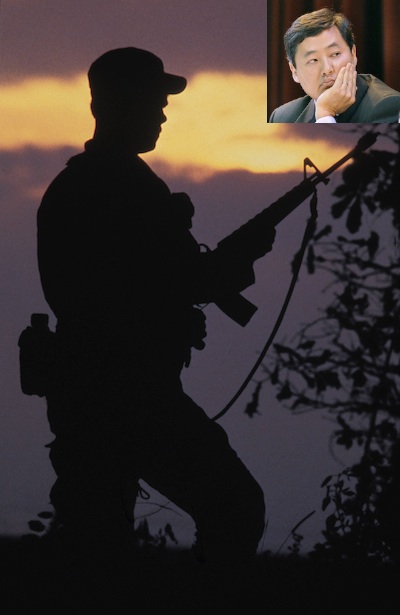In John Yoo’s vision of executive power, the president can legally order a village of civilians “massacred,” according to the internal Justice Department report released Friday.
But in a letter (.pdf) sent to the DOJ last October, Yoo’s lawyer, Miguel Estrada, accused the DOJ’s Office of Professional Responsibility of ripping “out of context” Yoo’s statement on the massacre question.
Estrada argues that OPR included the exchange “in an effort to shock the reader and to make clear to all right-thinking people that Professor Yoo is a bad man, indeed.” (See page 5 of the letter.)
The massacre exchange comes during the OPR report’s discussion of Yoo’s August 2002 memo (.pdf) that is widely seen as one of the key opinions authorizing torture.
The document — which is known as the Bybee Memo because it was signed by Yoo’s boss at the Office of Legal Counsel, Assistant Attorney General Jay Bybee — argues that the U.S. law banning torture would be unconstitutional if it “impermissibly encroached” on the president’s commander-in-chief power.
An OPR investigator asked Yoo “to explain how the torture statute would interfere with the President’s war making abilities.” Here’s the back-and-forth that followed, which is quoted in the OPR report and was first caught by Michael Isikoff at Newsweek:
Q: I guess the question I’m raising is, does this particular law really affect the President’s war-making abilities ….
Yoo: Yes, certainly.
Q: What is your authority for that?
Yoo: Because this is an option that the President might use in war.
Q: What about ordering a village of resistants to be massacred? … Is that a power that the president could legally–Yoo: Yeah. Although, let me say this. So, certainly, that would fall within the commander-in-chief’s power over tactical decisions.
Q: To order a village of civilians to be [exterminated]?
Yoo: Sure.
That’s from page 64 of the report.
But Yoo through his attorney says that’s only part of the exchange.
Estrada’s letter provides what it claims are additional quotes from the same exchange, in which Yoo dismisses the OPR investigator’s “parade of horribles” as insufficient to answer the constitutional question at hand. And he cites President Truman’s bombing of Hiroshima and Nagasaki as “a legitimate use of the Commander-in-Chief power.”
OPR investigators ultimately found that Yoo engaged in “professional misconduct” in his role drafting the torture memos. But that finding was overruled by a top DOJ official, meaning that OPR’s conclusion will not be referred to state bar disciplinary authorities where Yoo, now a Berkeley law professor, is licensed.
You can read Estrada’s statement on the release of the OPR report here. And below is the full text of a footnote from Estrada’s letter responding to OPR on the massacre question:
… OPR rips out of context Professor Yoo’s response to an OPR hypothetical on whether the President might make a tactical decision in war to “massacre” a village pursuant to his Commander-in-Chief power. F.R. at 64. OPR obviously includes this· snippet in an effort to shock the reader and to make clear to all right-thinking people that Professor Yoo is a bad man, indeed. Of course, OPR provides none of the relevant context, in which Professor Yoo gave the example of President Truman’s use of the atomic bomb on Hiroshima and Nagasaki, and explained that the “parade of horribles” offered by the OPR investigators did not answer the relevant separation-of-powers question being discussed. See July 11,2005 Yoo Tr. at 117·20; id. at 119 (Professor Yoo: “[Y]ou’re right. It could lead to all kind of parade{s) of horribles. You know, you could say, look, there was a legitimate use of the Commander-in-Chief power when President Truman decided to nuke, you know, two Japanese cities. And that was a terrible thing.”); id. at 120 (professor Yoo: “1 don’t think the parade of horribles answers the Constitutional question, because I could easily .. , flip them all and say Congress [instead of the President) ordered them to do it. And then you would say, well, Congress shouldn’t have that power. That’s such a bad result.”). This excerpt is emblematic of OPR’s selective use of sources, the true extent of which cannot be known by Professor Yoo or his counsel in light of OPR’s steadfast refusal to make available the primary materials on which it relies.
(This post has been updated to include Estrada’s response.)









